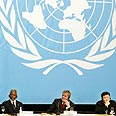
UN singles out Israel for human rights abuse
New UN human rights watchdog authorizes package plan to continue scrutiny of Israel while dropping investigations in Cuba, Belarus. Move slammed by Canada, US. Leading US congresswoman: 'To its shame, the UN Human Rights Council celebrated its first birthday by giving gifts to Fidel Castro and the enemies of the democratic state of Israel'
Members of the UN's new human rights watchdog on Tuesday formally agreed to continue their scrutiny of Israel while halting investigations into Cuba and Belarus - a move that immediately drew fire from Canada and the United States.
The decision was part of a package of reforms adopted by the members of the Human Rights Council to change how it conducts its future work, including how and when to launch investigations into some of the world's worst rights offenders.
The council, which was formed last year to replace the discredited UN Human Rights Commission, passed the compromise package despite objections from Canada over plans to continue singling out Israel for scrutiny by the global body.
The European Union, which played a key role in the negotiations, said ahead of the meeting that it remained to be seen how the council can perform on the basis of the agreement.
''The package is certainly not ideal, but we have a basis we can work with,'' said Ambassador Michael Steiner of Germany, which currently holds the EU presidency. ''The package must prove its value in practice.''
The United States - which is only an observer to the 47-nation body - has been skeptical since the beginning.
The council's members had negotiated for a year on the ground rules for how it will operate over the next four years, but last-minute demands by China on Monday threatened to scuttle negotiations.
China had demanded that two-thirds of the council's 47 members - rather than the current simple majority - agree before an expert is appointed to make a special investigation of alleged rights violations in a country.
It only dropped its objections after the council's outgoing president, Luis Alfonso de Alba of Mexico, engaged members in 14 hours of tense talks, eventually presenting the meeting with an updated compromise noting that resolutions against a country should have ''the broadest possible support'' - preferably they should be co-sponsored by at least 15 member countries - before being considered.
''We have all made compromises, it is not a perfect text. Negotiations never achieve a perfect text,'' de Alba told reporters shortly after midnight.
Among the changes were the establishment of a ''universal periodic review'' mechanism under which all countries will have their rights record examined regularly.
The new agreement also removes two mandates given to UN-appointed rights experts to examine the records of Cuba and Belarus, a move strongly criticized by non-governmental organizations, the United States and some European countries.
Nine other expert mandates, including on Haiti, Somalia, Congo, Sudan, Myanmar, North Korea and the Palestinian territories, will continue.
'Gift for Castro, enemies of Israel'
An influential Cuban-American member of Congress, Ileana Ros-Lehtinen of Florida, said she would seek to halt US funding to the council because of the ''hopelessly flawed'' rules exempting Cuba and Belarus and targeting Israel.
Ros-Lehtinen, the ranking Republican on the House Foreign Affairs Committee, said she plans to offer an amendment to the Foreign Operations Appropriations legislation that is scheduled for a vote later this week by the US House of Representatives.
''To its shame, the UN Human Rights Council celebrated its first birthday by giving gifts to Fidel Castro, the authoritarian regime in Belarus and the enemies of the democratic state of Israel,'' she said.
Under the package each council session may deal with urgent human rights crises as they develop - over the objections of countries that feared it could be used to unfairly single out developing nations.
The large Muslim and African groups, which dominate the council, had lobbied hard to minimize the scope for naming and shaming countries over their human rights records, but make an exception for Israel, the only government explicitly criticized so far by the body. Censure by the council brings no sanctions beyond international scrutiny.
The new agreement contains an agenda for future council meetings that provides for regular discussions of ''human rights violations and implications of the Israeli occupation of Palestine and other occupied Arab territories.''
Israeli Ambassador Itzhak Levanon said the accord was disappointing because the council had failed to ensure that it would be ''non-selective and impartial.''
''It is not a bright day for the protection of human rights,'' Levanon said, adding that the agreement ''perpetuates the immoral fixation on Israel.''
The United States expressed its regret over the Israel provision.
''The United States cautions that a biased, permanent agenda on the occupied Palestinian territories, and the arbitrary elimination of two vital country mandates, Cuba and Belarus, raise serious questions about the institutional priorities of the Human Rights council,'' US Ambassador Warren W. Tichenor said.
Canada moved to oppose the adoption of the text during an afternoon session, but was defeated by 46-1 in a vote called by the council's new president, Doru Costea of Romania.
Rights groups were skeptical about the agreement.
''The decision presents a floor for the council's work, but a great deal more needs to be built,'' said Peggy Hicks, global advocacy director for the New York-based organization. She said the agreement ''gives leeway to countries that seek to weaken human rights protections.''










